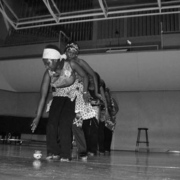If it had not been for African Americans, we would not be able to regulate traffic, because an African American invented the traffic light. We would not have been able to build and use skyscrapers, because an African American invented the elevator. Clothes dryers, ironing boards, refrigerators and lawn mowers would all be absent from our homes because these things were also invented by African Americans.
At the end of the 13th annual We Speak, the participants gathered on stage and listed the many ways in which America would be different were it not for the contributions of African Americans to our society. This year’s We Speak, in celebration of the 100-year anniversary of Black History Week, was a success for both the audience and the participants.
We Speak is a student-run program coordinated by the Black Student Alliance (BSA). It is the final event of Black History Month, at the end of a long line of activities stretching throughout February.
BSA board member Shenita Ollie ’05 described the program as a "combination of celebrating Black History Month as well as all our talents."
It gives the students an opportunity for "self-expression," added Keishonda Simms ’04, co-director of BSA. This year, about 35 students participated in 28 acts.
The performances included singing, dancing and poetry reading. Many of the poems were original ones read by their authors. Among the performers were students from the Latin American Student Organization as well as Director of Multicultural Affairs Clayton Cobb.
At the opening of the performance, the board members of BSA came onstage and recited the quote that appears on this year’s Black History Month t-shirts:
"Sometimes we wear the mask. Sometimes we smile over and through the sorrow and the rage. Sometimes we forget that we are different and sometimes we simply ignore that we are different. Sometimes we lie through omission about who we are and what we feel. But today… we speak."
This theme continued throughout the evening’s program. Many students called for change in attitudes towards African Americans and their history. Others emphasized the need for unity and cooperation among multicultural groups.
"There was a big push for others in the multicultural community to help [with the program] this year," said Simms.
However, the focus of the program is still on the black experience. Jumal Lewis ’06 summed it up in his original poem at the beginning of the program. "Being black still isn’t easy…Black people, never forget your history."
According to Simms, the audience turnout this year was bigger than last year. Both the audience and the participants were pleased with the event’s success.
"I was very happy. People have been telling me it’s the best show that they’ve seen," said Simms.
"I think the turnout this year was great," said Ollie. "Everyone has come up and talked to me about how great it was. We got up there and we said what we wanted to say and we touched people."
Audience members agree. "I really liked it. I was at times challenged, inspired, offended and impressed," David Holman ’06 said.
Next year, Ollie says, We Speak will probably have the same format it has used in the past. The program has grown so much in recent years it was moved out of Nourse Theater and into the Concert Hall to accommodate the larger and larger audiences.



